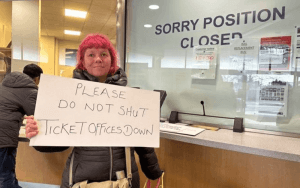Disabled people have been ignored by policy-makers in the post-COVID rush to introduce low-traffic neighbourhoods (LTNs), according to new research by a disabled people’s organisation.
Although disabled people have both positive and negative views about LTNs, local authorities and transport bodies have failed to consult with them on the potential impact of LTNs on their lives and travel, says the Pave the Way report.
It is the first detailed research into the impact of LTNs on disabled people.
The schemes aim to reduce traffic on roads and promote walking, wheeling and cycling – so-called “active travel” – by restricting access for vehicles to residential roads.
The report has been produced by Transport for All (TfA), which interviewed disabled people and carers from 19 London boroughs, as well as Newcastle, Manchester, Yorkshire, Surrey, Oxford and Edinburgh.
The use of LTNs increased rapidly in London from May last year, after changes to road traffic regulations – introduced because of the pandemic – allowed local authorities to introduce them without consulting residents beforehand.
The TfA research found many disabled people felt “a great sense of injustice and unfairness at LTN measures, because there is such a distinct lack of alternative options for transport”.
The report says: “In some of the areas where LTNs have been introduced, participants have told us that the streets are very unfriendly.
“They say uneven pavements, trees and tree roots, lack of dropped kerbs, street clutter and dockless bikes all contribute to it being very difficult and exhausting to get around by foot, wheelchair, or cycle.”
The schemes have proliferated at a time when many disabled people are not using public transport because of the pandemic.
One wheelchair-user, from north London, told researchers: “So how do I get to St Pancras?
“I can’t take the Tube as none of the Tube stations in Camden are accessible.
“Buses aren’t great for us who are ‘vulnerable’ at the moment, particularly as they’ve only got one space for wheelchairs.
“People are currently standing in these to be at a safe distance, so are less prepared to move, meaning driving was my only real option.
“That has been taken away from me, because of the difficulty of [the] extra time [driving now takes].”
The research found that 72 per cent of participants criticised how the introduction of an LTN in their local area had been communicated to them.
Another criticism raised by TfA’s research was that LTNs have led to longer journey times for residents, as well as their care workers, with travel becoming more exhausting, expensive, complicated or difficult.
One disabled participant in the research, from Lewisham, said: “Well, I did to go to the chemist at the end of last week, and where it normally would take me about five to seven minutes, it took me three quarters of an hour.”
Of the 78 disabled people and carers whose interview responses were analysed, three-quarters of them (77 per cent) said they had seen journey times increase after an LTN was introduced in their neighbourhood.
A third (33 per cent) reported an increase in traffic danger, while 18 per cent said this had decreased because of an LTN.
The report concludes: “It is clear from our findings that, although some disabled people are experiencing benefits as a result of LTNs, many disabled people are being disproportionally and negatively impacted, compounded by the many existing barriers that disabled people face in many aspects of their lives.”
Among the report’s recommendations is for “meaningful engagement” with disabled people; for communication about the schemes – and the way they are implemented – to be more accessible; and for “dispensation” for disabled residents, allowing them to access their homes by any vehicle they choose, including taxis.
Kirsty Hoyle, TfA’s chief executive, said: “This heated and divisive debate has seen disabled people being spoken for, not to.
“This has added to the growing frustration, compounded by the lack of engagement and consultation, that disabled people’s concerns are not heard.
“LTNs, in their current format, are too much ‘stick’ and not enough ‘carrot’: they bring negative impacts for those who continue to use cars, but few incentives or changes that increase disabled people’s opportunities to access active travel.”
Katie Pennick, TfA’s campaigns lead, added: “Ripping [LTNs] out and going back to normal isn’t the solution, when ‘normal’ wasn’t accessible to disabled people, either.
“We need immediate measures and long-term solutions to tackle these issues.”
Picture: A vandalised LTN scheme in Ealing last summer. Picture by Dr Amy Kavanagh
A note from the editor:
Please consider making a voluntary financial contribution to support the work of DNS and allow it to continue producing independent, carefully-researched news stories that focus on the lives and rights of disabled people and their user-led organisations.
Please do not contribute if you cannot afford to do so, and please note that DNS is not a charity. It is run and owned by disabled journalist John Pring and has been from its launch in April 2009.
Thank you for anything you can do to support the work of DNS…

 Rail company’s ‘stealth’ ticket office cuts plan is ‘unforgivable’ and ‘horrendous’
Rail company’s ‘stealth’ ticket office cuts plan is ‘unforgivable’ and ‘horrendous’ Research shows how transport bodies could add accessibility into vital planning tool
Research shows how transport bodies could add accessibility into vital planning tool Network Rail apologises after failing to spend £65 million put aside to improve access at stations
Network Rail apologises after failing to spend £65 million put aside to improve access at stations